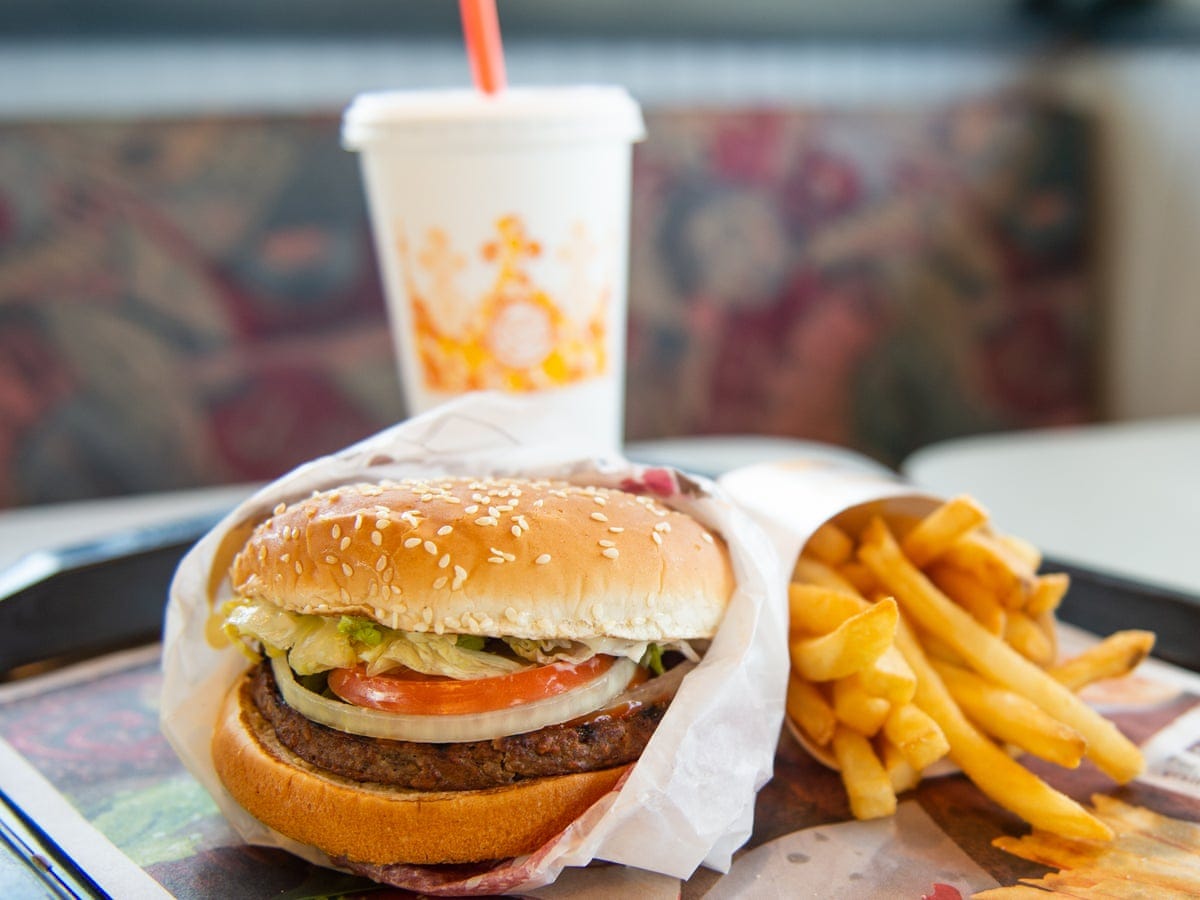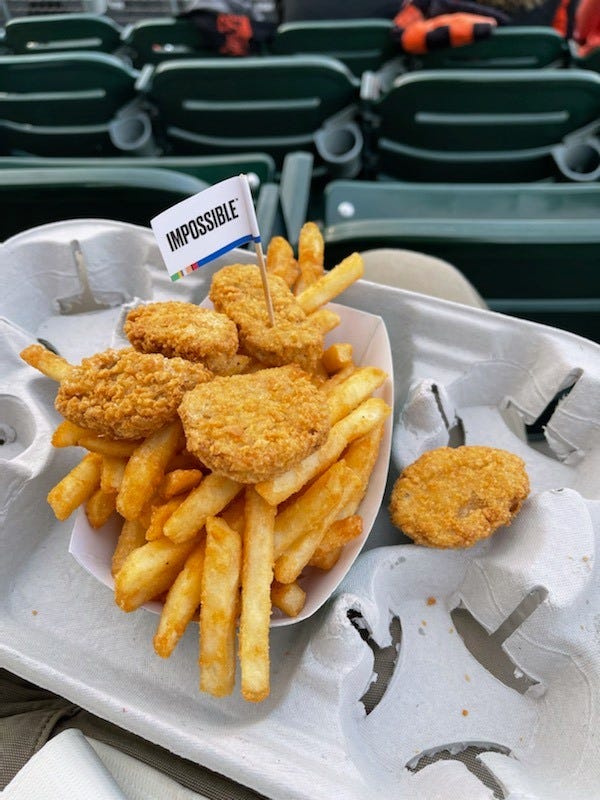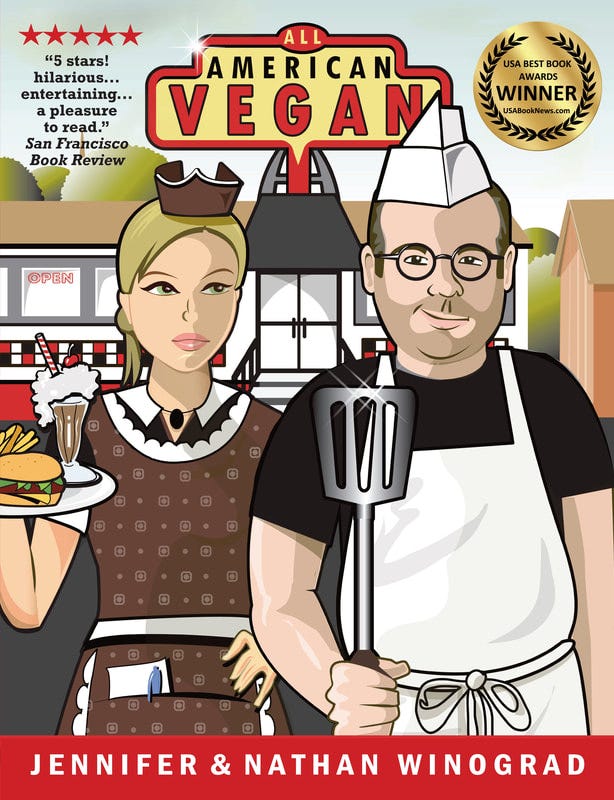There’s no chickens in KFC’s new “chicken” nuggets
So why are vegans complaining?

On the heels of the McPlant burger at McDonald’s and Chipotle’s vegan chorizo, KFC announced that starting Monday, people can order plant-based “chicken” at all U.S. locations. It will come in a six or 12-piece bucket.
A KFC spokesperson said that customers “are going to be amazed” because “KFC Beyond Fried Chicken is so delicious, our customers will find it difficult to tell that it's plant-based.” But before the first bucket is even sold, vegans and vegetarians are complaining about cross-contamination because it is cooked in the same oil as their animal-based items. Others are complaining about how “unhealthy” it is. And still others are complaining about supporting companies like KFC, given the sheer number of animals who die because of them.
Here’s why I believe — from an animal rights perspective — people should rethink those arguments.
Cross-contamination

KFC and other fast food restaurants, like Burger King, cook both their plant-based and animal-based products in the same oil and/or grill. I understand why vegans don’t like it and I would rather it not occur, too. I also think restaurants should think this through more thoughtfully. Indeed, some do. P.F. Chang's, for example, notes that they cook their plant-based foods with dedicated space, pots and pans, and utensils. That said, I want to offer a different perspective as to why cross-contamination does not prevent my ordering food.
To me, veganism isn't about the food. I know this sounds counterintuitive: that ethical plant-based eating is not about the food, but it isn’t. It’s about the animals and making sure that the choices I make do not cause loss of life or harm animals. It’s about taking action — or refusing to take certain actions — to encourage a kinder, gentler world for them to live in. And whether my otherwise plant-based meal comes into contact with a grill or oil that isn’t strictly used for plant-based foods doesn’t impact that.
Health
No one eats fast food for their health. More importantly, my goal is singular: to end harm to animals. Key to this is promoting plant-based alternatives of the kinds of foods people want to eat. From the moment they are born to the moment their necks are slit, the vast majority of chickens raised and killed for food will experience lives of unremitting torment. They will not know contentment, respite, safety, happiness, or kindness. Instead, they will live a short life characterized by inescapable physical discomfort, social deprivation, the thwarting of every natural instinct and constant stress, all punctuated by moments of pain, terror, and eventually, the deliberate infliction of a brutal and untimely death. If people will not change what they are eating and where they are eating it, what the food is made of has to change.
As such, I am not concerned about fat content, sodium content, GMOs, or whether the flavors and colors are natural or artificial. I don't want to create multiple hurdles to spare the lives of animals.
Supporting Companies like KFC
McDonald’s, Burger King, KFC, and other fast food franchises selling vegan versions of their best selling foods make veganism more appealing, more widely available, and more mainstream. Such changes can only serve to further the welfare of animals and are essential to more widespread veganism for two primary reasons.
First, one of the most common reasons people fall off the vegan wagon — or don’t even try it in the first place — is because of the inconvenience. That is becoming less of a problem as ubiquitous restaurant chains like Red Robin, White Castle, Shake Shack, Bareburger, and others add plant-based options. As Jennifer and I predicted in All American Vegan, our cookbook, if you make it easy and convenient for people to choose plant-based options, more people will.
Second, changing society in the profound and monumental way in which vegans seek to do so is an incremental process that must methodically build a new vegan infrastructure to replace an old one based on animal killing and exploitation. And that will never happen overnight. It also means having some strange and unexpected bedfellows. But, as we have seen time and time again, when the vegan aisle gets larger, the butcher’s aisle gets smaller. Once chains like Starbucks began carrying soymilk and other non-dairy milks, for example, their popularity grew. Conversely, cow’s milk sales declined. In 2018, the dairy industry lost another billion in sales to plant-based milks.
One cause for concern
There is, however, one significant animal welfare concern with KFC’s new plant-based chicken, and, ironically, it is the one that the vegan community mostly overlooks. Beyond Meat, the company that makes it, may source their coconut oil, one of the ingredients, from countries that enslave primates.
The majority of coconuts sold across the world come from Thailand, Indonesia, and Malaysia, where they are picked by primates. Agile and adept climbers, pig-tailed macaques are acquired as infants by farmers. They are chained at the neck and trained to climb trees to pick coconuts. They are beaten regularly, worked to exhaustion, fed non-nutritious food, and deprived of socialization with their kind. They suffer from PTSD and frequently engage in self-mutilating behavior. When they become old and outlive their usefulness — suffering from mental illness, missing teeth, and unable to forage for food or protect themselves from predators — they are left in the wild to die.
You can listen to a podcast in which Jennifer and I discuss this issue here.
Beyond Meat will not reveal the country they source their coconut oil from. I’ve asked on multiple occasions, only to be ignored or told the information is “proprietary.” By contrast, Impossible Foods, which makes “chicken” nuggets, sausage, meatballs, and Burger King’s plant-based whopper, has confirmed that their coconut oil comes from the Philippines where primates are not enslaved.

It would indeed be a tragedy if people embracing KFC’s plant-based “chicken” substituted one form of animal cruelty for another. Unfortunately, Beyond Meat, which can put the issue to rest, isn’t talking.
P.S. If, like me, you are concerned about harming monkeys with your consumer dollars, there’s a recipe in All American Vegan for fried “chicken” that gives the Colonel a run for his money.






GOOD NEWS
interesting...still the reasons to not support the fast food companies; that really do not care about vegan ideals out way the other reasons. the coconut situation is a different story and i am glad to here your report on it